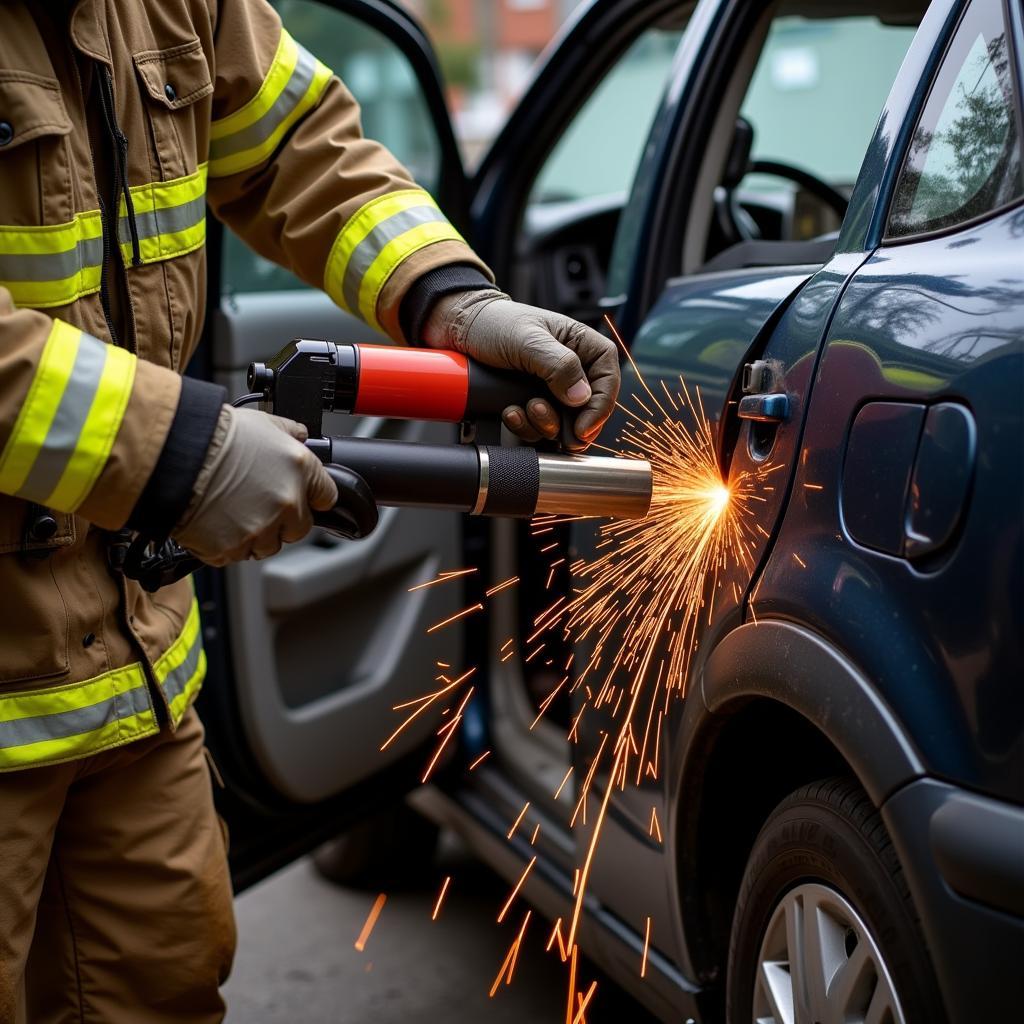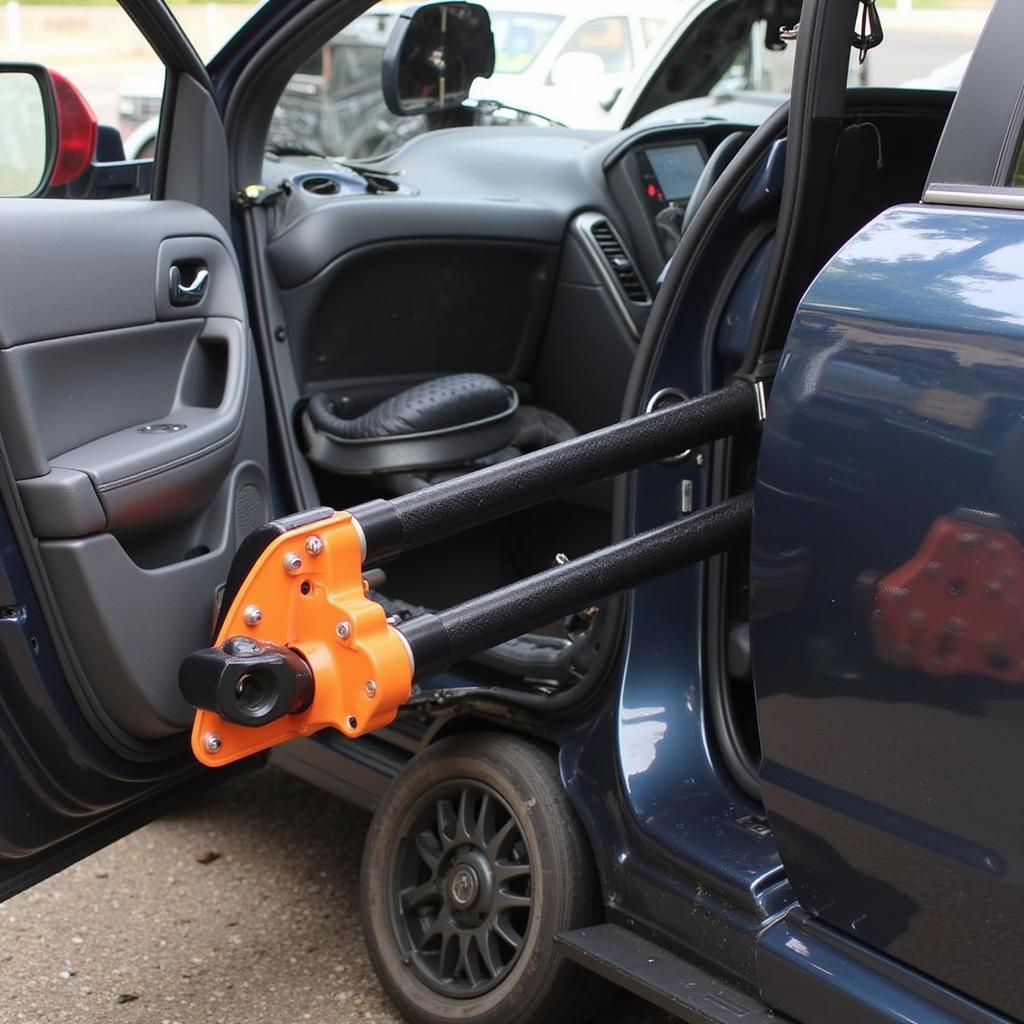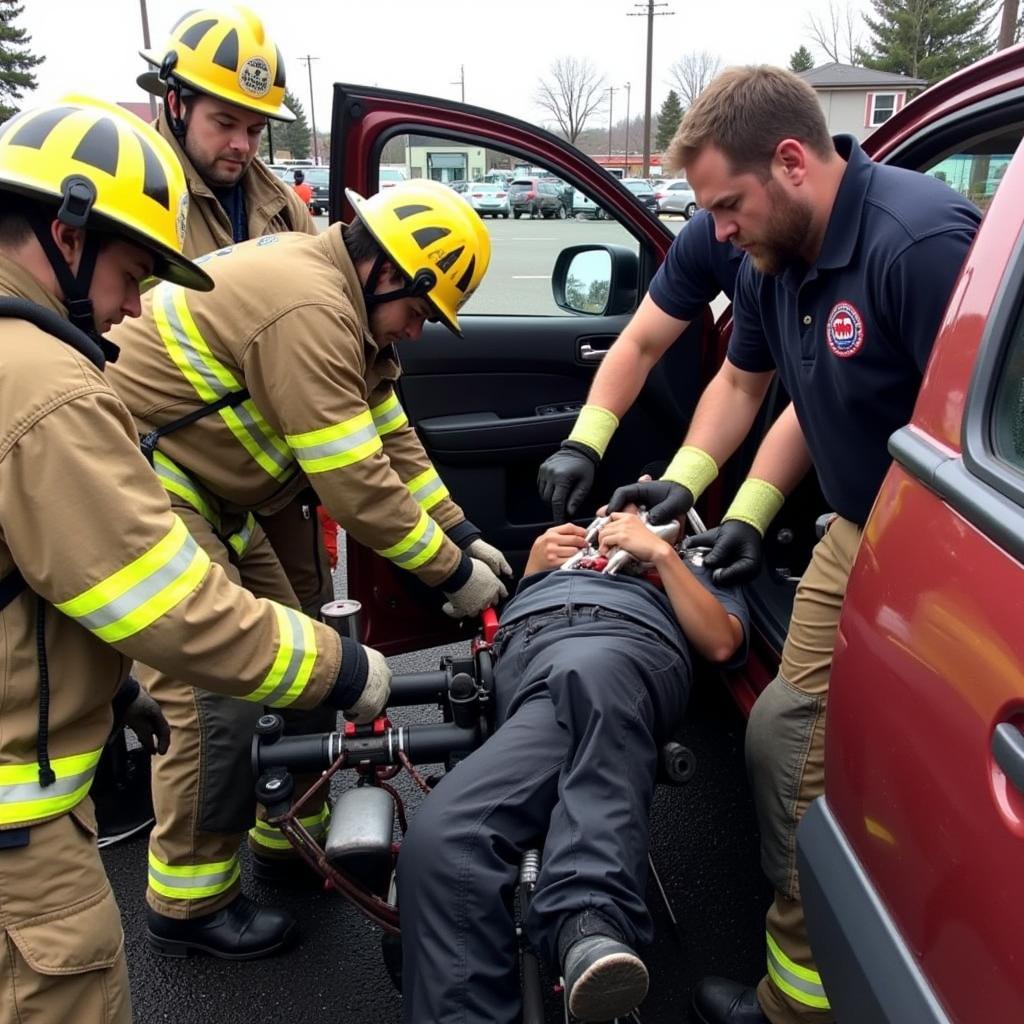Firefighter tools for car wreck extractions are crucial for saving lives. These specialized tools allow firefighters to quickly and safely remove trapped individuals from mangled vehicles, minimizing further injury and maximizing the chances of survival. This article dives deep into the world of these life-saving devices, exploring their functionalities, benefits, and importance in emergency situations.
Essential Firefighter Tools for Vehicle Extrication
Firefighter tools used in car wreck extractions are far more advanced than simple crowbars. They are specifically designed to handle the complexities of modern vehicle construction, offering a range of capabilities to address various entrapment scenarios. These tools are categorized based on their function, including cutting, spreading, stabilizing, and lifting.
Cutting Tools: The Jaws of Life and Beyond
When we think of firefighter tools for car wrecks, the “Jaws of Life” often comes to mind. While this term is often used generically, it actually refers to a specific brand of hydraulic rescue tools. These powerful cutters, spreaders, and combination tools utilize hydraulic pressure to slice through metal, spread apart crushed structures, and create access points to trapped victims. Beyond the Jaws of Life, other cutting tools employed include:
- Hydraulic Cutters: Designed for swiftly cutting through steel, these tools are essential for removing doors, roofs, and other vehicle components.
- Reciprocating Saws: These versatile saws can cut through a variety of materials, including metal, plastic, and wood, making them useful for removing debris and obstacles.
- Plasma Cutters: Offering precise and rapid cutting capabilities, plasma cutters are increasingly being used for intricate extrications involving high-strength steel.
- Air Chisels: Powered by compressed air, these chisels are useful for breaking apart smaller pieces of debris and creating entry points.
 Firefighters using hydraulic cutters to remove a car door during a rescue operation
Firefighters using hydraulic cutters to remove a car door during a rescue operation
Spreading Tools: Creating Space for Rescue
Spreading tools are crucial for widening gaps and creating space to free trapped individuals. These tools utilize hydraulic pressure to exert immense force, allowing firefighters to pry open crushed doors, dashboards, and other vehicle components. Common spreading tools include:
- Hydraulic Spreaders: These tools feature two arms that expand outward with tremendous force, creating space for rescuers to access victims.
- Combination Spreaders/Cutters: These versatile tools offer both spreading and cutting capabilities, providing a compact and efficient solution for various extrication scenarios.
 A hydraulic spreader being used to widen a gap in a crushed car door
A hydraulic spreader being used to widen a gap in a crushed car door
Stabilizing Tools: Ensuring Safety During Extrication
Stabilizing a wrecked vehicle is paramount to prevent further collapse and ensure the safety of both the trapped individuals and the rescue personnel. Common stabilizing tools include:
- Cribbing: Wooden or composite blocks used to support and stabilize the vehicle, preventing it from shifting during the extrication process.
- Struts: Telescopic metal supports that provide additional stability and prevent the vehicle from collapsing.
- Airbags: Inflatable bags used to lift or stabilize the vehicle, offering a versatile and adaptable solution for various scenarios.
Lifting Tools: Raising and Moving Heavy Objects
Lifting tools are essential for raising and moving heavy objects, such as overturned vehicles or large pieces of debris. These tools include:
- Hydraulic Jacks: Powerful jacks capable of lifting substantial weight, allowing rescuers to access trapped individuals underneath vehicles.
- Airbags: These versatile tools can also be used for lifting, providing a controlled and stable lift in various situations.
- Cranes: In some cases, heavy-duty cranes may be necessary to lift and remove large vehicles or debris.
Why Specialized Firefighter Tools are Essential
Using the right firefighter tools during car wreck extractions is critical for a number of reasons:
- Speed: Time is of the essence in rescue operations. Specialized tools allow firefighters to quickly access and extricate trapped victims, minimizing the time they spend in potentially life-threatening situations.
- Safety: These tools are designed to operate safely and effectively in challenging environments, protecting both the rescuers and the victims.
- Efficiency: Specialized tools are engineered to handle the specific challenges of vehicle extrication, enabling firefighters to perform their tasks with greater efficiency and precision.
 Firefighters using specialized tools to extricate a victim from a car wreck
Firefighters using specialized tools to extricate a victim from a car wreck
Conclusion: The Importance of Effective Extrication Tools
Firefighter tools for car wreck extractions are vital life-saving devices. From hydraulic cutters and spreaders to stabilizing struts and lifting airbags, these specialized tools enable firefighters to effectively and safely rescue individuals trapped in mangled vehicles. Investing in and training with these tools is crucial for ensuring the best possible outcomes in emergency situations involving car wrecks.
FAQ
- What is the most commonly used firefighter tool in car wreck extractions? Hydraulic cutters and spreaders, often referred to as the “Jaws of Life,” are the most commonly used tools.
- How are firefighters trained to use these specialized tools? Firefighters undergo rigorous training programs to learn how to safely and effectively operate these tools in various extrication scenarios.
- What are the latest advancements in car wreck extrication technology? Recent advancements include the development of lighter and more powerful hydraulic tools, as well as the increasing use of plasma cutters for cutting through high-strength steel.
- How does vehicle construction affect the choice of extrication tools? Modern vehicles often utilize high-strength steel and other advanced materials, requiring specialized tools capable of cutting through these tougher materials.
- What safety precautions are taken during car wreck extractions? Firefighters prioritize stabilizing the vehicle and protecting the victim from further injury during the extrication process.
- What are the challenges faced by firefighters during car wreck extractions? Challenges include limited space, unstable vehicles, hazardous materials, and the emotional toll of dealing with traumatic situations.
- What other tools besides the “Jaws of Life” are commonly used? Other essential tools include reciprocating saws, air chisels, cribbing, struts, airbags, and hydraulic jacks.
Need support? Contact us via WhatsApp: +1(641)206-8880, Email: [email protected] or visit us at 910 Cedar Lane, Chicago, IL 60605, USA. We have a 24/7 customer support team.

Leave a Reply